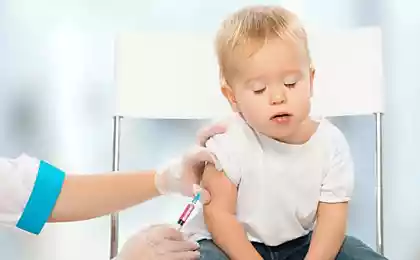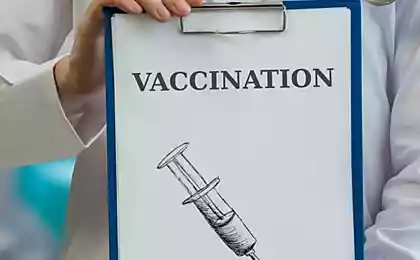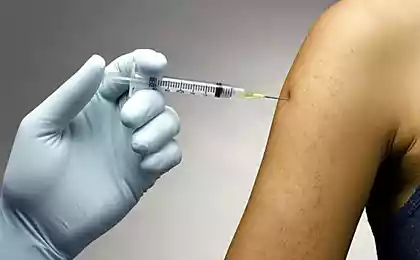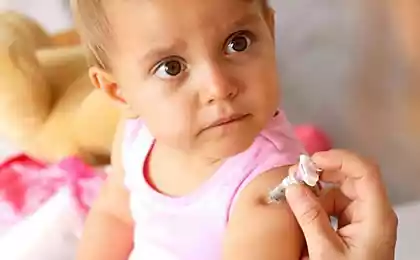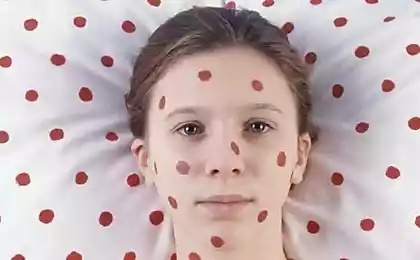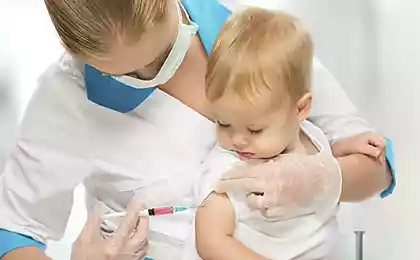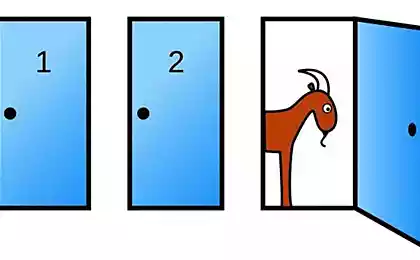474
Vaccination probability. Part 2
Who and why refusing to have their children vaccinated? Reckless hippie, carefree young parents who don't care about children, or Vice versa — educated people think, like the hero of our interview with Eugene Peskin?
Part 1 can be read here
AR: Interesting assumption. Tell me, how do you choose a particular vaccination? It is unlikely that you Wake up in the morning and think: "Write me today about the measles vaccine!"? EP: basically the impetus for writing particular notes is the news reason — for many years, every day special robot brings me the news about vaccines and studies in this area. Read the information sometimes becomes a trigger of their own mini-research on available sources. It happens that the text we have to write after the consultation or interviews with applicants for assistance, or just someone who asked a question.
AR: And what is the most interesting, in your opinion, vaccination news has been released lately? EP: Here we must distinguish: it is interesting to me, or interesting to the public? For me was very interesting about the possible mechanism of failure of a vaccine for chlamydia, which tested on children in third world countries a few decades ago, vaccinated would get sick more often. It is assumed that the presence of antibodies created in the body a "false sense of security": "Task complete!", he thought and attacked chlamydia when the real invasion.
A broad response is likely to have a study confirming that the epidemic of pertussis in the United States caused by the use of current vaccines — those who were relatively well vaccinated, are asymptomatic carriers of the disease, infecting those whom whooping cough is really dangerous: children up to six months.
AR: as far As I know, during an epidemic of whooping cough in the United States not to be sick a lot six-month-old babies (in the group just above death, so that's about it wrote), and lots of adults, which, of course, is not encouraging. Then, you know, I have long discussed this news with other moms... And that for me personally, the information that the grafted acellular pertussis vaccine perevalivaet whooping cough symptoms, has become almost another plus for her instilling... You did not attend such thoughts? EP: I Have both their child has whooping cough my grieving. For children over six months old, whooping cough is a very tedious but relatively safe disease that with proper treatment ends after 4-8 days. If it strikes an adult, for him there is no danger, though, of course, the cough is very annoying. But lifelong immunity, including from mothers to babies.
AR: Here it is: "with proper treatment". Only where can I get this treatment? It is easier to root (and that's what many think). You've just made one of the most compelling arguments of anti-vaccination: the transfer of protection of children from immune mothers. Could you elaborate? And another question: do you think that wild pertussis provides lifelong immunity? EP: I do not consider myself "anti-vaccination". I believe that parents need to make conscious, informed decisions about vaccination, and, if possible, share with those interested in the information that is in violation of the law and medical ethics (and sometimes out of ignorance) not misleading some doctors and staff vaccination clinics.
About the transfer of immunity: if we're not talking about the ethical and practical side of the issue, every disease and vaccination should be considered separately. Against whooping cough is extremely important the protection of maternal antibodies during the first months of life of newborns, because we have already said that whooping cough is dangerous only during this period. These antibodies are transferred both via the placenta and through breast milk. (At the same time (there is a tricky moment!) the first pertussis vaccination during this period may, paradoxically, worsen the protection against whooping cough, exhausting the pool of maternal antibodies neutralize the vaccine antigen.)
All the guidance on infectious diseases, as deactivating and poslevuzovskogo period, I agree that the whooping cough in a practical sense gives lifelong immunity. I believe that this can be guided to make decisions. Isolated cases, as in all biological systems, there are (studies show that re-ill 1 in 500), but are of a mild nature, — in children, in particular, such replays, not being the subject of a special study with a laboratory test would not be identified as pertussis. Of course, if the situation with the circulation of the causative agent of pertussis, Bordetella pertussis, change, and the immune system can be weakened without "reminders", but looking alive on the epidemic of pertussis in Moscow (and reading about the us) no signs can't see it.
AR: I Understand you. Not always the most obvious answer is the correct one. I'm talking about the statistical probability of the actual human disease X disease, if his analysis of it gave a positive result. However, what, in your opinion, it may be relevant to mandatory vaccination? EP: a Common mistake is not wrong arithmetical calculations, and in the unwillingness to perceive the entire space of hypotheses that must be considered. Here's an example: before vaccination, 50 years ago, the death rate from measles in developed countries was less than 0.02% of the officially registered cases. Take the effectiveness of measles vaccine in 92 %. Question: how to reduce the mortality rate of measles vaccination? The answer is very simple: I have no idea. Need information about: a) what are the death rates from all causes have unvaccinated against measles, plus, b) the all-cause mortality in vaccinated against measles. There is an obvious, but overlooked consideration is that as measles and vaccination against it, can non-specific influence on other diseases and mortality from them. But the main difficulty in this conversation is to explain that those of 0.01-0.02% risk of death, are not distributed randomly and evenly: it is with a high probability of face with features of measles immunity, and they likely are the remaining 8 %, who did not catch the vaccine.
As an illustration: in a recent outbreak of measles among adults in Disneyworld in the USA that received such media and political impact, her more than 140 people, mostly unvaccinated. They're all fine, no complications were reported. At the same time on the other side of the US completely unrelated to this outbreak, vaccinated and hospitalized on another occasion a woman had contracted the hospital-acquired measles and died. Saying that she had a compromised immune system.
AR: Can you briefly tell us when she was vaccinated and died from what? EP: Nothing special there was not: the deceased had been vaccinated, contracted in the hospital after possible contact, she was checked for antibodies and the analysis showed that it has them in sufficient quantity. Typical symptoms (rash) she was not, according to autopsy results — measles pneumonia. During life the diagnosis was not put.
AR: That is on the background of low immunity... all, however, individually, and how little we still know... well, let's get to the question of how this reduces the incidence of the measles vaccine. In my opinion, it is more important in the case of vaccination campaigns. For example, I tend to see vaccination primarily economic measure (omitting the slogan on the elimination of bacteria and viruses, which usually covered the who, as in my opinion, all links in a chain), which aims to reduce the number of cases (by decreasing the chain of transmitters of infection); * to reduce the number of reasons why people get sick and take sick leave; reduce the "burden" on public health (this, incidentally, may explain the rather aggressive policy of vaccination against influenza); finally, allow moms early to give children in groups etc... And frankly, I think that this (economic) objective of the vaccination, apparently, more or less cope. Or maybe you have a different opinion?
EP: That brings us to another way to evaluate the effectiveness of vaccination is economic. First, notice that not all agree with the view that economic viability is a priority: let's imagine a hypothetical situation, when one scales the death of one small child and another — 2000 adults, who will have ailments to take sick leave for a week each. Speaking in terms of direct economic costs, the more profitable the death of a child. However, in most modern societies, this choice would be ethically unacceptable.
AR: I a little about it. Understand fatal consequences you can get from anything (and in fact instill a small range), so it makes no sense to discuss it from all not vaccinated. Although, of course, I can't deny that vaccination helps to reduce these figures. However, she is the risk, albeit small, but the risk. In addition, you know, when it started to decrease mortality rates, and whether there is a strong correlation with vaccination. And in a situation where every year 2 million children die due to lack of water... the EP: Economic justification is primarily from manufacturers of vaccines, that they are obliged to be guided by economic interests (and they do). The question is what guided the society. For example, judicial decisions on compensation for families where children receive disability as a result of vaccination, is higher than the payments that get the families of children with disabilities need life-long care. So take this economic logic can be very difficult. If we do the economic calculations, the answer in many cases depends on the planning horizon.
In response to a direct question: two times vaccination vaccine measles virus in non-tropical countries drastically reduces the incidence of "wild" measles, until local extinction. Instead, from an economic point of view, we get the actual cost of vaccination, the incidence of measles vaccinated (even conservatively — that 10% of all vaccinated), vaccination complications, nonspecific impact on the incidence of (and as vaccination itself, and that there are no "wild" measles). The cost of vaccination somehow growing all the time: measles began to vaccinate with one dose, and now need one or two additional injection of a"booster". We simply do not have enough data to give a complete answer that is more expensive for society. And, as often happens, in the moment when it all counted, it turns out that cheated.
Here's a simple chicken pox, complications casuistically that is so rare that the vaccination against it was introduced under the flag of economic efficiency: in countries with high labor productivity, said the representatives of the pharmaceutical industry, it is better to vaccinate a child than one parent to care for him during his illness, while the creation of GDP. Of course, at first it was about one dose of the vaccine for life. But now re-introduced vaccination and post-vaccination immunity for a period of 10 years. In practice, it turned out that just a few years, economic losses have risen sharply: it is assumed that due to reduced circulation of the virus veranorogum adults ceased to activating "immune reminders" and dramatically increased the number of adults, ill with "shingles" (it is the same virus) that often occurs very hard. In the United States, which was introduced by chicken pox vaccine in the age group older than 65 years, the incidence of herpes zoster has increased over the 1992-2010 period by 39 %.
By the way, about the aggressive policy of influenza vaccination. That's really what-what, and on vaccination against influenza the verdict of evidence-based medicine is known: "Virtually no clinical evidence that these vaccines affect such things as the duration of hospital stay, hospital mortality".
AR: Yes, flu vaccines most, probably, has long been clear. But back to Corey. It is not clear what you mean by "non-specific effects on morbidity" and what is bad is that no wild measles? EP: Have any vaccinations (strictly speaking, any disease) is specific and non-specific health effects for individuals and the entire population. The specific effect of measles vaccine is its impact on infection, disease and mortality actually from measles and its complications. A non-specific effect is what is changing because of this vaccination health for other reasons associated with the diagnosis of "measles" indirectly, the mechanism of which may not be obvious. For example, vaccinated people can be infected without being ill with the measles, but it can be more prone to severe leakage of other infections, there are studies proving this. Even some vetryanaya vaccination works worse, if it was made shortly after MMR vaccination. Besides, making it difficult to spread one virus, you free up an ecological niche for other pathogens.
Close theme: repeatedly put forward the hypothesis about the relationship of the measles vaccine with autism. On the one hand, we are told that this relationship was not confirmed, on the other — emerge periodically unpleasant scandals that official studies deliberately hide data.
Today, I believe, we again do not have enough data to conclude positively or negatively the total non-specific effect of measles vaccination. Although it has enough information to ask finally on this issue.
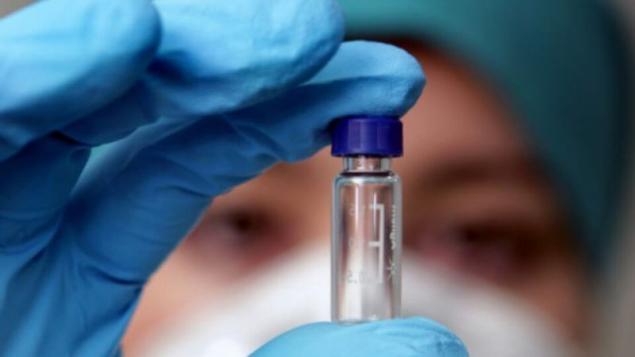
AR: that's what's interesting: instilling a disease into the body artificially introduced pathogen, that he got sick of them and developed immune response, but a full-fledged disease it can not be called, as the pathogen is usually injected directly into the blood, and it does not get a "natural" way through mucous membranes. What I'm saying? Is it possible to definitely assume that the vaccinated do not perevalivaet measles, even in some "perverted" form? EP. "Full disease" is a term automatically establishes a value in the fact of illness. Again, I do not a priori willing to talk about such values. But we can confidently say that the vaccination disease in the case of measles vaccine is different from the natural disease, and, as you rightly point out, speed and Dating site with other virus, and the virus to another. It is reasonable to assume that each measles vaccination person carries vaccinators infection or disease, which, by design, in the case of twofold repetition should give him immunity to the other disease natural measles.
AR: I think that you will be able to comment on the arguments that such a statement (it was printed by one of our respected physicians in the magazine "doctor", that multicomponent vaccines (meaning 5 or more infections) do not give any additional load on the child body, as our immune system is designed to deal with the many disease-causing pathogens simultaneously, and therefore these vaccines are safe. What is your opinion? EP: In the framework of scholastic dispute, it would be possible to draw the attention of honourable doctors that our immune system is designed to eliminate many disease-causing pathogens simultaneously using nonspecific immunity factors, ranging from holistic skin and antimicrobial properties of saliva and sweat, ending with phagocytosis. The situation when 5 different infectious pathogens enter the body in sufficient quantity to activate the deployed specific antibody response to all 5 pathogens, theoretically looks highly unlikely — in any case, I didn't have to hear about the child who would at the same time there sick so many infections in a natural form. In reality, when infected so many infections I would have assumed that a specific immune response to them will unfold sequentially.Fortunately, we are in an advantageous position compared to the medieval scholastics in the dispute about the number of angels on the end of a vaccination needle: it is possible to carry out studies on the standards of evidence-based medicine — a randomized, blind, placebo-control, and get answers to such questions.
AR: thank you! published
P. S. And remember, only by changing their consumption — together we change the world! ©
Join us in Facebook , Vkontakte, Odnoklassniki
Source: www.medkrug.ru/article/show/privivka_ot_verojatnosti?part=1#p1
Part 1 can be read here
AR: Interesting assumption. Tell me, how do you choose a particular vaccination? It is unlikely that you Wake up in the morning and think: "Write me today about the measles vaccine!"? EP: basically the impetus for writing particular notes is the news reason — for many years, every day special robot brings me the news about vaccines and studies in this area. Read the information sometimes becomes a trigger of their own mini-research on available sources. It happens that the text we have to write after the consultation or interviews with applicants for assistance, or just someone who asked a question.

AR: And what is the most interesting, in your opinion, vaccination news has been released lately? EP: Here we must distinguish: it is interesting to me, or interesting to the public? For me was very interesting about the possible mechanism of failure of a vaccine for chlamydia, which tested on children in third world countries a few decades ago, vaccinated would get sick more often. It is assumed that the presence of antibodies created in the body a "false sense of security": "Task complete!", he thought and attacked chlamydia when the real invasion.
A broad response is likely to have a study confirming that the epidemic of pertussis in the United States caused by the use of current vaccines — those who were relatively well vaccinated, are asymptomatic carriers of the disease, infecting those whom whooping cough is really dangerous: children up to six months.
AR: as far As I know, during an epidemic of whooping cough in the United States not to be sick a lot six-month-old babies (in the group just above death, so that's about it wrote), and lots of adults, which, of course, is not encouraging. Then, you know, I have long discussed this news with other moms... And that for me personally, the information that the grafted acellular pertussis vaccine perevalivaet whooping cough symptoms, has become almost another plus for her instilling... You did not attend such thoughts? EP: I Have both their child has whooping cough my grieving. For children over six months old, whooping cough is a very tedious but relatively safe disease that with proper treatment ends after 4-8 days. If it strikes an adult, for him there is no danger, though, of course, the cough is very annoying. But lifelong immunity, including from mothers to babies.
AR: Here it is: "with proper treatment". Only where can I get this treatment? It is easier to root (and that's what many think). You've just made one of the most compelling arguments of anti-vaccination: the transfer of protection of children from immune mothers. Could you elaborate? And another question: do you think that wild pertussis provides lifelong immunity? EP: I do not consider myself "anti-vaccination". I believe that parents need to make conscious, informed decisions about vaccination, and, if possible, share with those interested in the information that is in violation of the law and medical ethics (and sometimes out of ignorance) not misleading some doctors and staff vaccination clinics.
About the transfer of immunity: if we're not talking about the ethical and practical side of the issue, every disease and vaccination should be considered separately. Against whooping cough is extremely important the protection of maternal antibodies during the first months of life of newborns, because we have already said that whooping cough is dangerous only during this period. These antibodies are transferred both via the placenta and through breast milk. (At the same time (there is a tricky moment!) the first pertussis vaccination during this period may, paradoxically, worsen the protection against whooping cough, exhausting the pool of maternal antibodies neutralize the vaccine antigen.)
All the guidance on infectious diseases, as deactivating and poslevuzovskogo period, I agree that the whooping cough in a practical sense gives lifelong immunity. I believe that this can be guided to make decisions. Isolated cases, as in all biological systems, there are (studies show that re-ill 1 in 500), but are of a mild nature, — in children, in particular, such replays, not being the subject of a special study with a laboratory test would not be identified as pertussis. Of course, if the situation with the circulation of the causative agent of pertussis, Bordetella pertussis, change, and the immune system can be weakened without "reminders", but looking alive on the epidemic of pertussis in Moscow (and reading about the us) no signs can't see it.
AR: I Understand you. Not always the most obvious answer is the correct one. I'm talking about the statistical probability of the actual human disease X disease, if his analysis of it gave a positive result. However, what, in your opinion, it may be relevant to mandatory vaccination? EP: a Common mistake is not wrong arithmetical calculations, and in the unwillingness to perceive the entire space of hypotheses that must be considered. Here's an example: before vaccination, 50 years ago, the death rate from measles in developed countries was less than 0.02% of the officially registered cases. Take the effectiveness of measles vaccine in 92 %. Question: how to reduce the mortality rate of measles vaccination? The answer is very simple: I have no idea. Need information about: a) what are the death rates from all causes have unvaccinated against measles, plus, b) the all-cause mortality in vaccinated against measles. There is an obvious, but overlooked consideration is that as measles and vaccination against it, can non-specific influence on other diseases and mortality from them. But the main difficulty in this conversation is to explain that those of 0.01-0.02% risk of death, are not distributed randomly and evenly: it is with a high probability of face with features of measles immunity, and they likely are the remaining 8 %, who did not catch the vaccine.
As an illustration: in a recent outbreak of measles among adults in Disneyworld in the USA that received such media and political impact, her more than 140 people, mostly unvaccinated. They're all fine, no complications were reported. At the same time on the other side of the US completely unrelated to this outbreak, vaccinated and hospitalized on another occasion a woman had contracted the hospital-acquired measles and died. Saying that she had a compromised immune system.
AR: Can you briefly tell us when she was vaccinated and died from what? EP: Nothing special there was not: the deceased had been vaccinated, contracted in the hospital after possible contact, she was checked for antibodies and the analysis showed that it has them in sufficient quantity. Typical symptoms (rash) she was not, according to autopsy results — measles pneumonia. During life the diagnosis was not put.
AR: That is on the background of low immunity... all, however, individually, and how little we still know... well, let's get to the question of how this reduces the incidence of the measles vaccine. In my opinion, it is more important in the case of vaccination campaigns. For example, I tend to see vaccination primarily economic measure (omitting the slogan on the elimination of bacteria and viruses, which usually covered the who, as in my opinion, all links in a chain), which aims to reduce the number of cases (by decreasing the chain of transmitters of infection); * to reduce the number of reasons why people get sick and take sick leave; reduce the "burden" on public health (this, incidentally, may explain the rather aggressive policy of vaccination against influenza); finally, allow moms early to give children in groups etc... And frankly, I think that this (economic) objective of the vaccination, apparently, more or less cope. Or maybe you have a different opinion?
EP: That brings us to another way to evaluate the effectiveness of vaccination is economic. First, notice that not all agree with the view that economic viability is a priority: let's imagine a hypothetical situation, when one scales the death of one small child and another — 2000 adults, who will have ailments to take sick leave for a week each. Speaking in terms of direct economic costs, the more profitable the death of a child. However, in most modern societies, this choice would be ethically unacceptable.
AR: I a little about it. Understand fatal consequences you can get from anything (and in fact instill a small range), so it makes no sense to discuss it from all not vaccinated. Although, of course, I can't deny that vaccination helps to reduce these figures. However, she is the risk, albeit small, but the risk. In addition, you know, when it started to decrease mortality rates, and whether there is a strong correlation with vaccination. And in a situation where every year 2 million children die due to lack of water... the EP: Economic justification is primarily from manufacturers of vaccines, that they are obliged to be guided by economic interests (and they do). The question is what guided the society. For example, judicial decisions on compensation for families where children receive disability as a result of vaccination, is higher than the payments that get the families of children with disabilities need life-long care. So take this economic logic can be very difficult. If we do the economic calculations, the answer in many cases depends on the planning horizon.
In response to a direct question: two times vaccination vaccine measles virus in non-tropical countries drastically reduces the incidence of "wild" measles, until local extinction. Instead, from an economic point of view, we get the actual cost of vaccination, the incidence of measles vaccinated (even conservatively — that 10% of all vaccinated), vaccination complications, nonspecific impact on the incidence of (and as vaccination itself, and that there are no "wild" measles). The cost of vaccination somehow growing all the time: measles began to vaccinate with one dose, and now need one or two additional injection of a"booster". We simply do not have enough data to give a complete answer that is more expensive for society. And, as often happens, in the moment when it all counted, it turns out that cheated.
Here's a simple chicken pox, complications casuistically that is so rare that the vaccination against it was introduced under the flag of economic efficiency: in countries with high labor productivity, said the representatives of the pharmaceutical industry, it is better to vaccinate a child than one parent to care for him during his illness, while the creation of GDP. Of course, at first it was about one dose of the vaccine for life. But now re-introduced vaccination and post-vaccination immunity for a period of 10 years. In practice, it turned out that just a few years, economic losses have risen sharply: it is assumed that due to reduced circulation of the virus veranorogum adults ceased to activating "immune reminders" and dramatically increased the number of adults, ill with "shingles" (it is the same virus) that often occurs very hard. In the United States, which was introduced by chicken pox vaccine in the age group older than 65 years, the incidence of herpes zoster has increased over the 1992-2010 period by 39 %.
By the way, about the aggressive policy of influenza vaccination. That's really what-what, and on vaccination against influenza the verdict of evidence-based medicine is known: "Virtually no clinical evidence that these vaccines affect such things as the duration of hospital stay, hospital mortality".
AR: Yes, flu vaccines most, probably, has long been clear. But back to Corey. It is not clear what you mean by "non-specific effects on morbidity" and what is bad is that no wild measles? EP: Have any vaccinations (strictly speaking, any disease) is specific and non-specific health effects for individuals and the entire population. The specific effect of measles vaccine is its impact on infection, disease and mortality actually from measles and its complications. A non-specific effect is what is changing because of this vaccination health for other reasons associated with the diagnosis of "measles" indirectly, the mechanism of which may not be obvious. For example, vaccinated people can be infected without being ill with the measles, but it can be more prone to severe leakage of other infections, there are studies proving this. Even some vetryanaya vaccination works worse, if it was made shortly after MMR vaccination. Besides, making it difficult to spread one virus, you free up an ecological niche for other pathogens.
Close theme: repeatedly put forward the hypothesis about the relationship of the measles vaccine with autism. On the one hand, we are told that this relationship was not confirmed, on the other — emerge periodically unpleasant scandals that official studies deliberately hide data.
Today, I believe, we again do not have enough data to conclude positively or negatively the total non-specific effect of measles vaccination. Although it has enough information to ask finally on this issue.

AR: that's what's interesting: instilling a disease into the body artificially introduced pathogen, that he got sick of them and developed immune response, but a full-fledged disease it can not be called, as the pathogen is usually injected directly into the blood, and it does not get a "natural" way through mucous membranes. What I'm saying? Is it possible to definitely assume that the vaccinated do not perevalivaet measles, even in some "perverted" form? EP. "Full disease" is a term automatically establishes a value in the fact of illness. Again, I do not a priori willing to talk about such values. But we can confidently say that the vaccination disease in the case of measles vaccine is different from the natural disease, and, as you rightly point out, speed and Dating site with other virus, and the virus to another. It is reasonable to assume that each measles vaccination person carries vaccinators infection or disease, which, by design, in the case of twofold repetition should give him immunity to the other disease natural measles.
AR: I think that you will be able to comment on the arguments that such a statement (it was printed by one of our respected physicians in the magazine "doctor", that multicomponent vaccines (meaning 5 or more infections) do not give any additional load on the child body, as our immune system is designed to deal with the many disease-causing pathogens simultaneously, and therefore these vaccines are safe. What is your opinion? EP: In the framework of scholastic dispute, it would be possible to draw the attention of honourable doctors that our immune system is designed to eliminate many disease-causing pathogens simultaneously using nonspecific immunity factors, ranging from holistic skin and antimicrobial properties of saliva and sweat, ending with phagocytosis. The situation when 5 different infectious pathogens enter the body in sufficient quantity to activate the deployed specific antibody response to all 5 pathogens, theoretically looks highly unlikely — in any case, I didn't have to hear about the child who would at the same time there sick so many infections in a natural form. In reality, when infected so many infections I would have assumed that a specific immune response to them will unfold sequentially.Fortunately, we are in an advantageous position compared to the medieval scholastics in the dispute about the number of angels on the end of a vaccination needle: it is possible to carry out studies on the standards of evidence-based medicine — a randomized, blind, placebo-control, and get answers to such questions.
AR: thank you! published
P. S. And remember, only by changing their consumption — together we change the world! ©
Join us in Facebook , Vkontakte, Odnoklassniki
Source: www.medkrug.ru/article/show/privivka_ot_verojatnosti?part=1#p1
Lose weight in French- once and for all!
How to make kinetic sand, playdough, finger paints and more!



